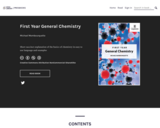
Short succinct explanation of the basics of chemistry in easy to use language and examples
- Subject:
- Chemistry
- Physical Science
- Material Type:
- Textbook
- Provider:
- eCampusOntario
- Author:
- Michael Mombourquette
- Date Added:
- 08/09/2021

Short succinct explanation of the basics of chemistry in easy to use language and examples
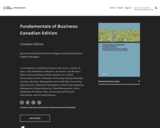
An introductory textbook in business that covers a variety of topics: The Foundation of Business, Economics and Business, Ethics and Social Responsibility, Business in a Global Environment, Forms of Business Ownership, Entrepreneurship: Starting a Business, Management and Leadership, Structuring Organizations, Operations Management, Motivating Employees, Management Human Resources, Union/Management Issues, Marketing: Providing Value, Accounting and Financial Information, and Personal Finances.
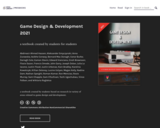
a textbook created by students based on research in variety of areas related to game design and development.
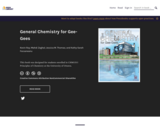
This book was designed for students enrolled in CHM1311 Principles of Chemistry at the University of Ottawa.
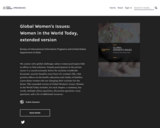
We cannot solve global challenges unless women participate fully in efforts to find solutions. Female participation in the private sector is a crucial economic driver for societies worldwide. Economic security benefits every facet of a woman’s life, with positive effects on the health, education and vitality of families. Learn about women who are changing their societies for the better. This extended version of Global Women’s Issues: Women in the World Today includes, for each chapter, a summary, key words, multiple choice questions, discussion questions, essay questions, and a list of additional resources.
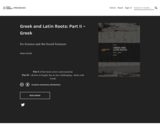
Part I of the book covers Latin material. Part II—shorter in length, but no less challenging—deals with Greek.
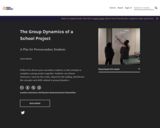
The Group Dynamics of a School Project was developed in order for students to learn about group dynamics through acting out the roles of five diverse post secondary students trying to complete a group project. Key elements of group dynamics are portrayed including conflict, leadership skills, groupthink, group climate, microaggressions and more. Each scene contains a short script to be read out loud, a prompt for improvising an ending, discussion questions, and key takeaways. Students come away with a better understanding of the theories behind group dynamics, increased self awareness, and a better understanding of other group members.
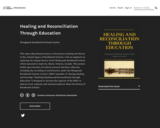
This open educational resource is focused on teaching the history of the colonial legacy of Residential Schools, with an emphasis on exploring the unique history of the Shingwauk Residential School which operated in Sault Ste. Marie, Ontario, Canada. This project builds upon decades of archival research and data collection, including the recording of oral histories, under the Shingwauk Residential Schools Centre’s (SRSC) mandate of ‘sharing, healing, and learning.’ ‘Realizing Healing and Reconciliation through Education’ is designed to increase the capacity of the SRSC to educate local, regional, and national audience about the history of Residential Schools.
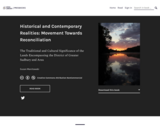
The idea behind the creation of this open textbook is twofold. First, it is written as a resource for educators to teach students about the Indigenous historical significance of the lands encompassing the Robinson-Huron Treaty area and more specifically the Greater Sudbury and Manitoulin area. Secondly, through the use of interactive mapping strategies, the textbook will serve as a guide for educators to develop a similar resource to document Indigenous stories from their own areas.
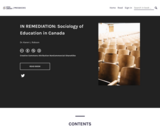
Sociology of Education in Canada utilizes a contemporary theoretical focus to analyze how education in Canada is affected by pre-existing and persistent inequalities among members of society.
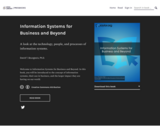
Welcome to Information Systems for Business and Beyond. In this book, you will be introduced to the concept of information systems, their use in business, and the larger impact they are having on our world.
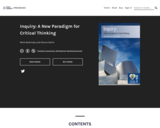
This volume reflects the development and theoretical foundation of a new paradigm for critical thinking based on inquiry. The field of critical thinking, as manifested in the Informal Logic movement, developed primarily as a response to the inadequacies of formalism to represent actual argumentative practice and to provide useful argumentative skills to students. Because of this, the primary focus of the field has been on informal arguments rather than formal reasoning. Yet the formalist history of the field is still evident in its emphasis, with respect to both theory and pedagogy, on the structure and evaluation of individual, de-contextualized arguments. It is our view that such a view of critical thinking is excessively narrow and limited, failing to provide an understanding of argumentation as largely a matter of comparative evaluation of a variety of contending positions and arguments with the goal of reaching a reasoned judgment on an issue. As a consequence, traditional critical thinking instruction is problematic in failing to provide the reasoning skills that students need in order to accomplish this goal. Instead, the goal of critical thinking instruction has been seen largely as a defensive one: of learning to not fall prey to invalid, inadequate, or fallacious arguments.
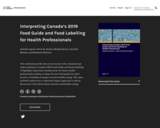
This textbook provides the novice learner with a foundational understanding of Canada’s 2019 Food Guide and Food Labelling. It highlights important considerations for future health professionals seeking to adopt the new food guide into their practice, including strategies towards healthy eating. This open textbook underscores a relational inquiry approach to inform discussions with clients about nutrition and healthy eating.
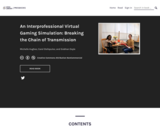
This virtual simulation promotes the application of knowledge and skills related to interprofessional collaboration and infection prevention and control practices. Learners will need a foundational knowledge in infection prevention and control practices, including routine practices and additional precautions guidelines. Learners will use their assessment and communication skills throughout the game. By the end of the virtual gaming simulation, learners will be able to apply interprofessional communication skills to foster collaboration and provide safe client care, demonstrate knowledge and skills related to infection prevention and control practices, and identify high risk areas to break the chain of transmission.
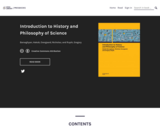
Philosophy of science asks questions that attempt to clarify exactly what science is, how it is different from other human endeavours, and how it works. We will take the opportunity to engage with the following pivotal questions of the philosophy of science in the first half of this textbook, all the while drawing from the rich history of science
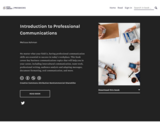
No matter what your field is, having professional communication skills are essential to success in today’s workplace. This book covers key business communications topics that will help you in your career, including intercultural communication, team work, professional writing, audience analysis and adapting messages, document formatting, oral communication, and more.
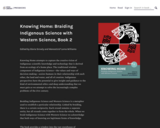
Knowing Home attempts to capture the creative vision of Indigenous scientific knowledge and technology that is derived from an ecology of a home place. The traditional wisdom component of Indigenous Science—the values and ways of decision-making—assists humans in their relationship with each other, the land and water, and all of creation. Indigenous perspectives have the potential to give insight and guidance to the kind of environmental ethics and deep understanding that we must gain as we attempt to solve the increasingly complex problems of the 21st century.
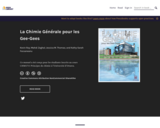
Ce manuel a été conçu pour les étudiants inscrits au cours CHM1711 Principes de chimie à l'Université d'Ottawa.
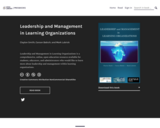
Leadership and Management in Learning Organizations is a comprehensive, online, open education resource available for students, educators, and administrators who would like to learn more about leadership and management within learning organizations.
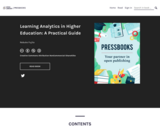
The aim of this practical guide is to introduce learning analytics to educators in higher education. To this end, we define learning analytics, provide some background to how learning analytics work, explore successful learning analytics implementations, and present findings from an exploratory study of perceptions of the users of learning analytics—educators, students, and advisors—of common metrics and visualizations from learning management system analytic tools at an Ontario university to provide a practical guide to learning analytics.